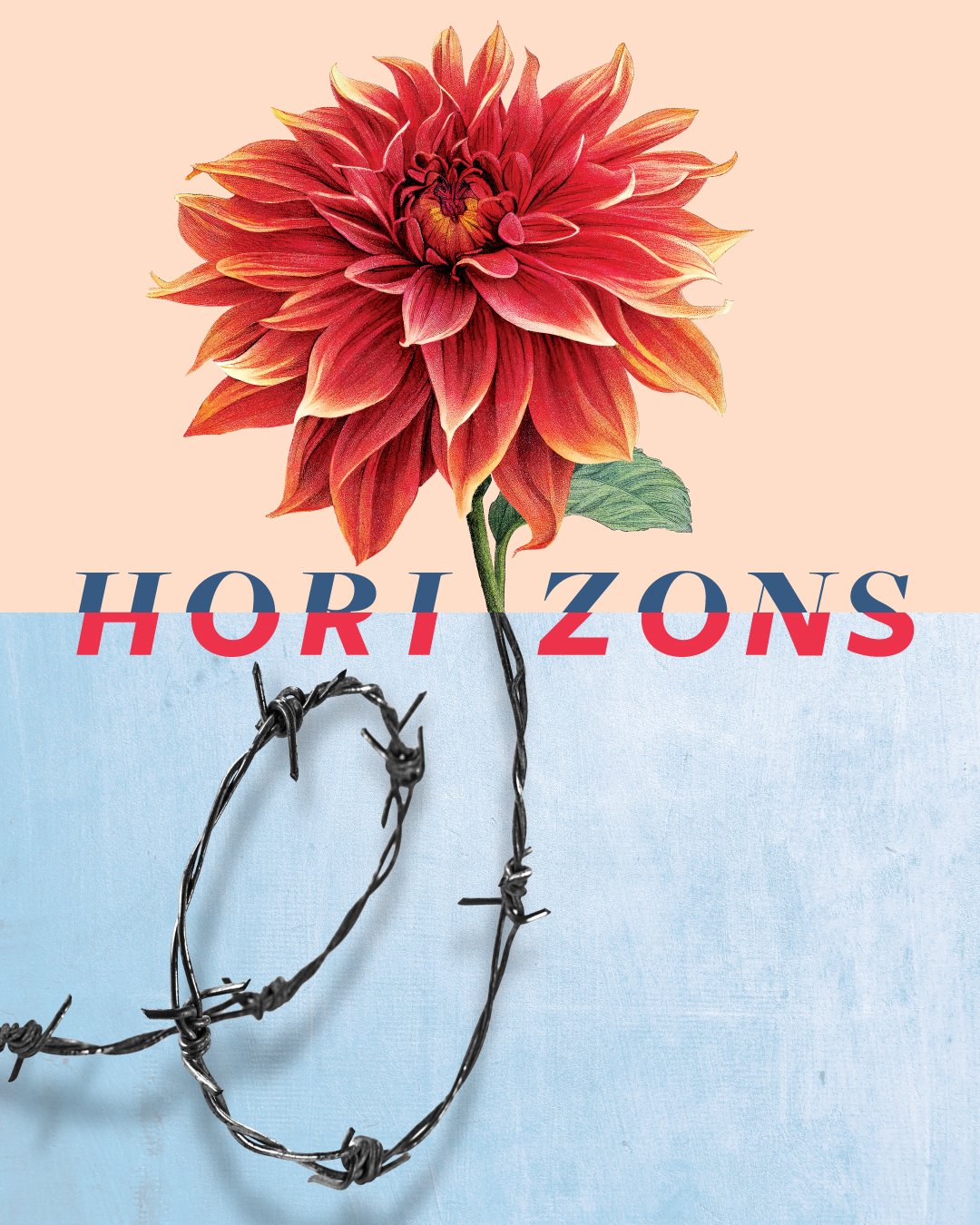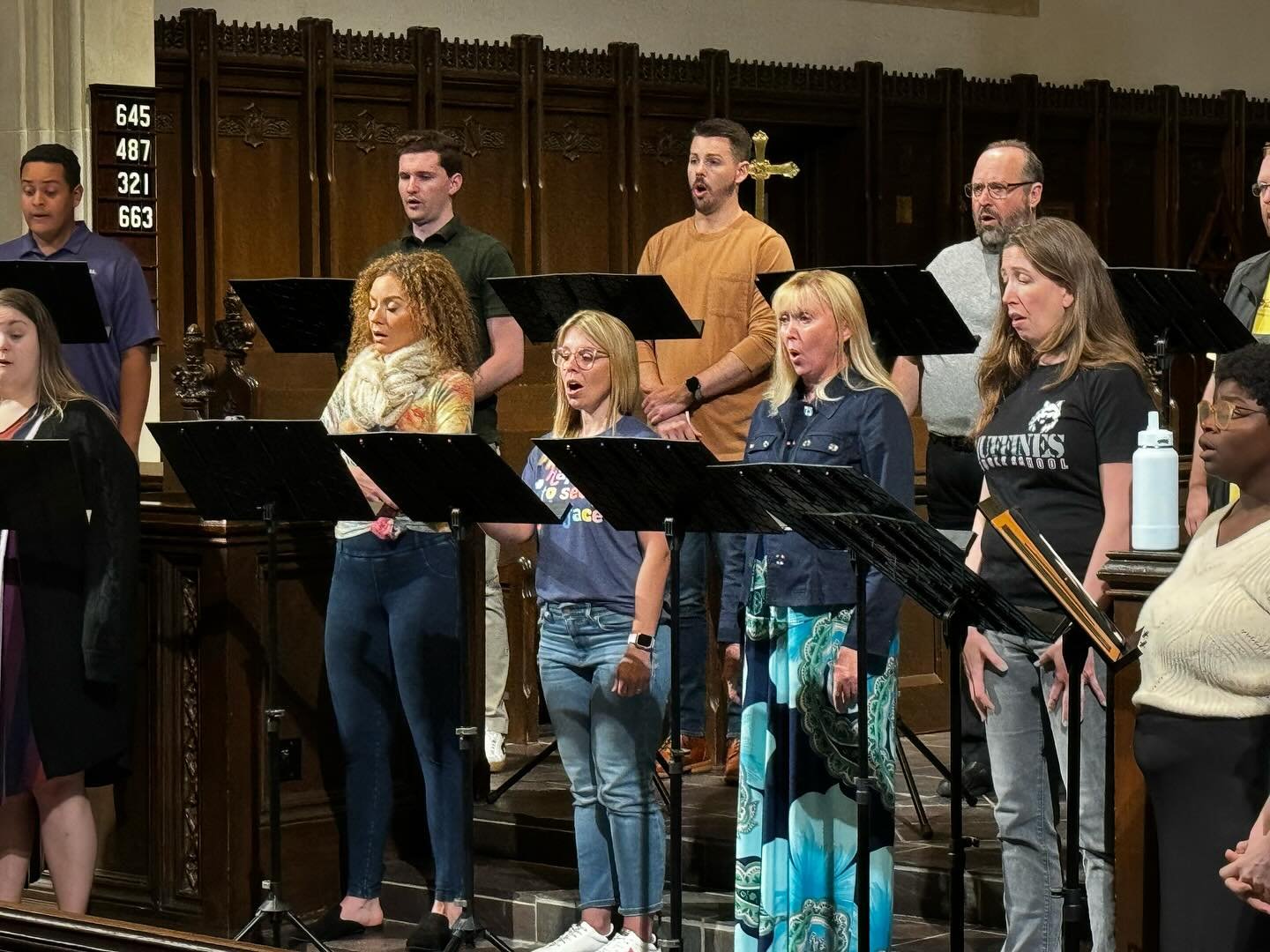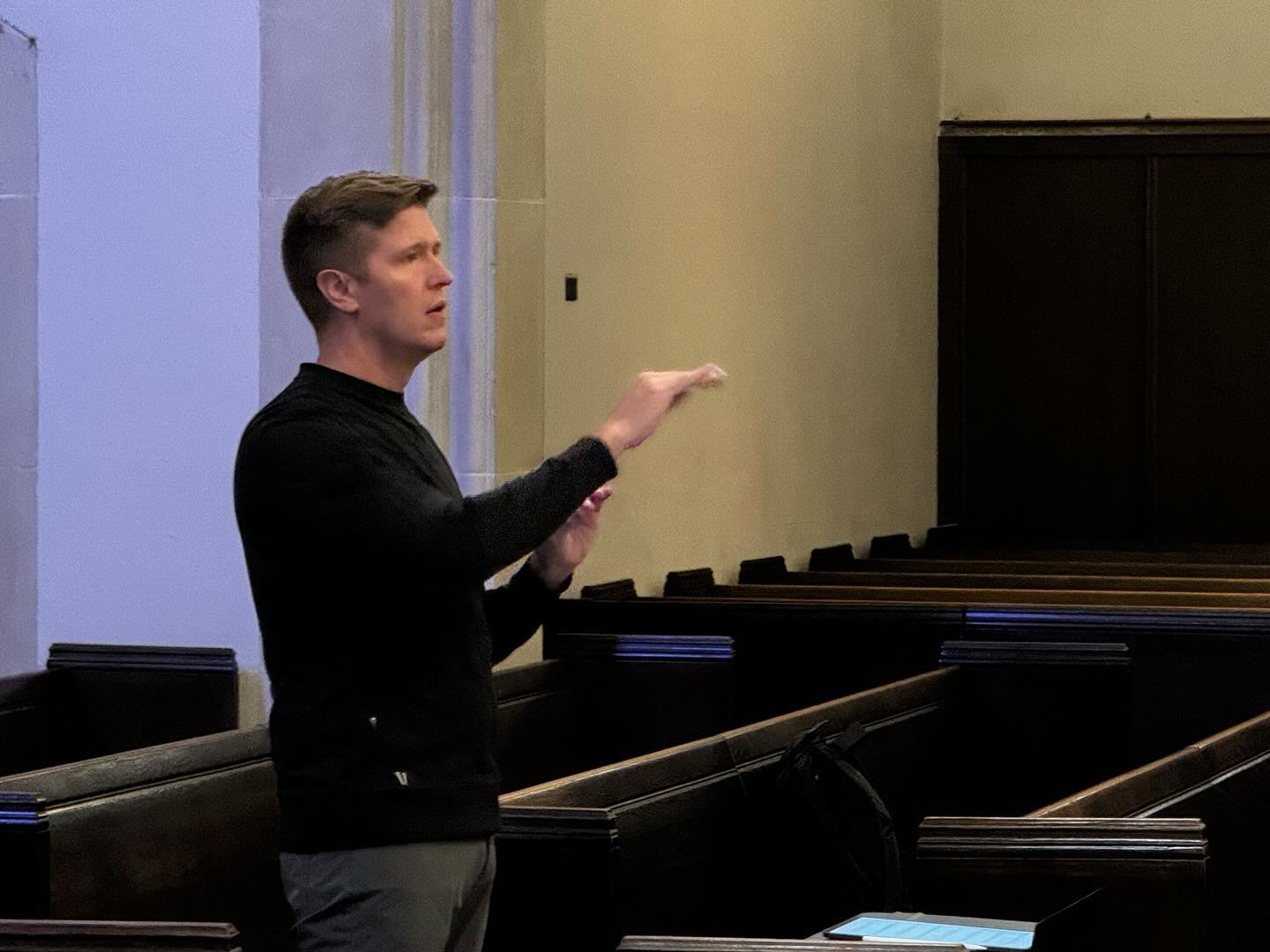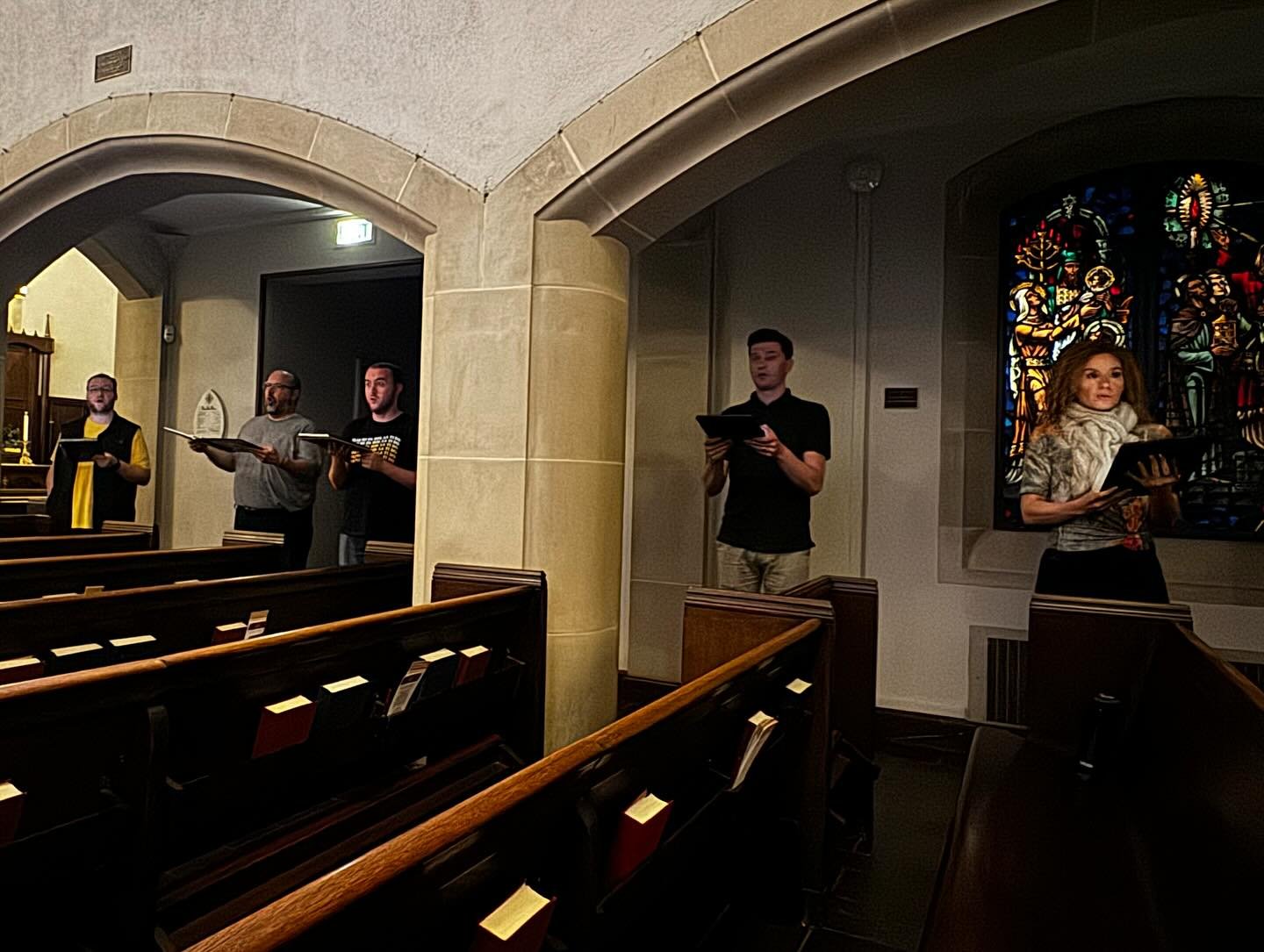@ Orpheus Chamber Singers
—Gregory Sullivan Isaacs
Orpheus Chamber Singers is a small choir made up of 24 voices, each singer a highly respected artist based in the Dallas area. The group holds a special place in the musical diadem of the Metroplex for its outstanding performances of a wide variety of music for a cappella choir. The repertoire runs from the ancient to the very modern, and features composers from well-known to obscure. The performances I attended on October 14 took place in the glorious interior of the Church of the Incarnation on McKinney Avenue in downtown Dallas. (The singers perform in a variety of church venues; details in the web link below.)
The group recently went through a seismic change. In 2021, after 27 highly successful seasons, founder Don Krebhiel moved to Emeritus status, handing off the artistic director’s role to J.D. Burnett. But we needn’t have worried about the future of the organization, even for a moment. Burnett’s season-opening concert “Horizons” presented a palette of music from Heinrich Isaac (1450-1517) to Caroline Shaw (b. 1982). Music ranged from the African-American experience to the rugged unforgiving landscapes of Iceland. Quite a spread!
Burnett’s approach to conducting is low key—standing erect, conducting without a baton, and keeping gestures mostly within the frame of his body. Sometimes he uses standard beat patterns, but other times mirrors his hands in a circular motion where downbeats go upwards. While unconventional, the singers responded with the precision that always has hallmarked Orpheus’ work, with Burnett’s impressive and subtle overlay of nuance and emotional empathy.
The wide-ranging program certainly put the choir through its paces. The incredible variety of languages (Icelandic?) and historical periods presented a huge stylistic challenge. Burnett and his musically supple group of singers transversed this treacherous landscape with élan. And though some of the foreign texts may have been understood by only a small portion of the audience, their variety was intriguing, and the words seemed crisply enunciated. Burnett carefully regulated the emotional and dynamic range of the music, so as to keep the explosive moments for the concert’s finale. He used the coolly pure vibrato-less sound typically used in such chamber repertoire, although the times he let it warm were most welcome.
Now to the program….
The ensemble filed in on the sides of the sanctuary and remained there for the first selection by the African-American composer Ysaye Maria Barnwell (b. 1946), "Would you Harbor Me?" The text repeats this question, adding the names of groups facing discrimination even in today’s more accepting society. It was a dramatic opening, for surely there were some in the audience who identified with at least one of these listed groups. The blend was surprisingly unified, considering the wide spacing of the singers. After the selection, the singers re-assembled in traditional choir formation at the front of the church.
In keeping with the concert’s stated intent to “explore themes of home, expatriation, exile, and cultural diaspora,” Orpheus continued with the Finlandia Hymn by Jean Sibelius (1865-1957). This much-loved chorale was drawn from his symphonic poem of the same name. It was written as a protest against the censorship imposed on Finland by the Russian Empire. The words came from the poet Veikko Antero Koskenniemi. Their blend was remarkable on this hymn-like piece, the sound so unified that it was reminiscent of an organ.
Some more traditional pieces of the Orpheus repertoire followed. We heard “Innsbruck, ich muss dich lassen” by Heinrich Isaac (1450-1517) and “Super flumina Babylonis” (based on Psalm 137) by Giovanni Pierluigi da Palestrina (c. 1525-1594). These were performed in the historically precise manner that has always been the glory of the Orpheus singers.
Up next, Iceland made an impressive contribution with “Veröld fláa sÿnir sig” by Hafliði Hallgrimsson (b.1941). The text describes the familiar hurt that words can cause. That piece was followed by “Thann Heiliga kross” by Anna Thorvaldsdottir (b. 1977). The text invites Christians to revel in the salvation bought by the sacrificial life of Jesus Christ. The singers made the most of the emotional contrast expressed in the words of these two very different pieces.
Caroline Shaw’s (b. 1982) “and the swallow” uses the Syrian Refugee Crisis as a starting point. The words are drawn from the text of the familiar Psalm 82 (“How lovely is thy dwelling place”). Keeping with the bird theme (though this poor creature is lost), Argentinian composer Carlos Guastavino’s (1912-2000) song “Se equivoco la paloma” (The Dove was Wrong) is set to a poem by Rafael Alberti about his exile during the Spanish Civil War.
After intermission, we heard “Shen khar venakhi,” a traditional Georgian tune harmonized by Z. Paliashvil. The text is attributed to the country’s King Demetrius I. Another protest song followed. “Parismaalase Lauluke” by the Estonian composer Veljo Tormis (1930-2017) had to be disguised to escape censorship. He called it “ An Aboriginal Song in Polynesian.”
The work that gave the concert its title followed. “Horizons” by South African composer Peter Louis van Dijk (b. 1953) tells the story of the Dutch takeover of the San, a South African aboriginal tribe. This unusual work intrigued the audience with the use of non-singing vocalizations such as aspirants, quarter-tone slides, and drumming. There were some outstanding soloists in this piece: Julie Bowdren, soprano; Eric Lewis, tenor; and De’Evin Johnson, baritone.
American songs ended the program. We heard “Goin’ Home,” drawn from the slow movement of Antonín Dvořák’s 1893 “From the New World” symphony. Many of those familiar with this famous melody line believe the composer adapted the tune of an existing spiritual—but no, it is original and written to prove a point. Haley Sicking was the fine soprano soloist for this piece.
Contrary to composers in other countries who often mined their folk music for melodies and inspiration, American composers of the time thought the young U.S.A. didn’t create the sort of folk music classical composers could use. To prove that our home-grown folk tunes held language and style that offered a wealth of possibilities, Dvořák’ composed a spiritual that sounded entirely genuine and fitting to his American audiences.
The program ended with Moses Hogan’s (1957-2003) “Walk Together Children,” a song for the slaves' perilous journey to the free states in the North. The beginning inquiry of the concert—”Will you harbor me?”—asked a vitally important question that the rest of the concert seemed to consider and wrestle with, though ultimately it left the answer up to us to resolve.
WHEN: October 14 and 15, 2023
WHERE: Church of the Incarnation, Dallas; St. Stephen Presbyterian Church, Fort Worth
WEB: For details of upcoming concerts: orpheuschambersingers.org



